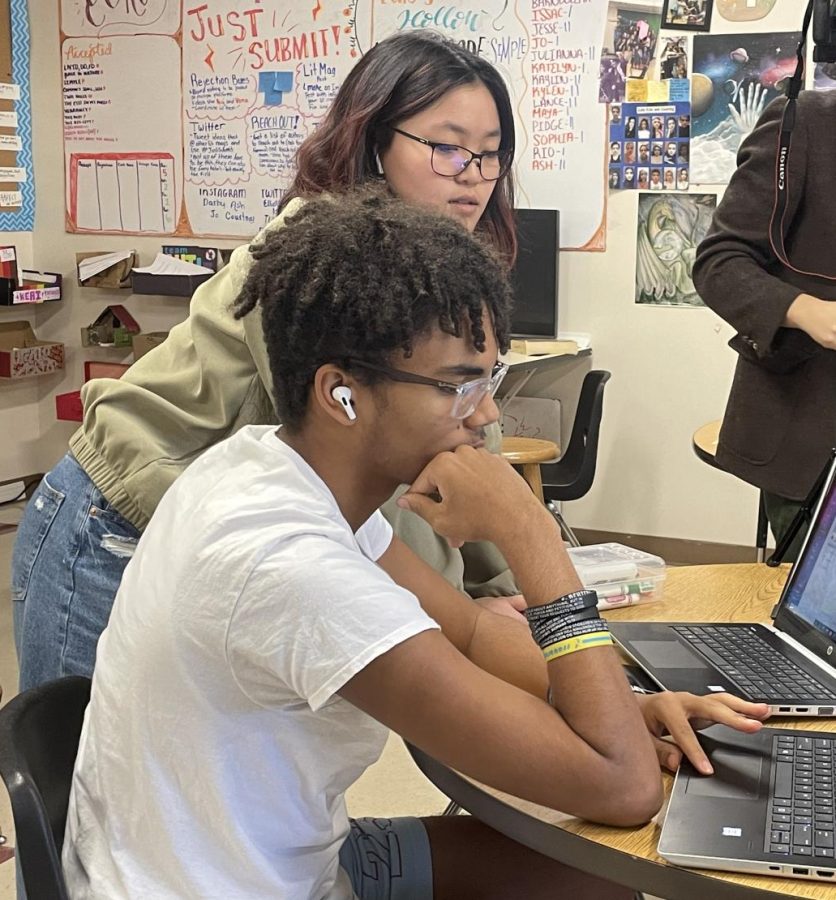Should AirPods Be Allowed in Schools?
St udents work while unconsciously listening to music that impacts their work and peer communication. Since AirPods were released, they have overrun schools leading to unnecessary distraction and, in some cases, declining grades. Photo courtesy of Olivia Pages.
Since their release in December 2016, AirPods have maintained popularity especially within school-aged kids as they assisted in keeping students focused and reduced stress levels, but kids have become deviant with their uses. AirPods allow a student to record themselves listing answers for a test and -as long as their hair is long enough- the headphones are virtually impossible for teachers to detect, which permits kids to easily cheat on tests. So, the questions have surfaced; what should the rules be on AirPod usage in schools? Should they be allowed when teachers permit so or banned all together?
Junior Madelyn Valenzuela explains how music is beneficial to her productivity, “Music helps me focus when I’m doing independent work, but I usually listen to songs that don’t have words, so I don’t start singing along in my head.”
While students say music helps them focus, it’s been proven impossible to sufficiently multitask which indicates students cannot truly comprehend lessons while listening to their favorite music, but does this constitute banning AirPods entirely?
As Valenzuela said, music is often helpful in decreasing distractions while doing independent work as long as the music itself is not distracting but completely banning AirPods would rip away this freedom. However, some students listen to music loudly to drown out distractions for themselves, however this causes distraction for those around them that cannot hear their own thoughts over the beats.
“Other students playing music in class doesn’t bother me as long as their phone is face down and the volume is not so loud I can hear it,” said Valenzuela.
Alternatively, AirPods with their wireless nature are made extremely easy to hide which leads students to often abuse headphone privileges. Teachers are tired of lecturing students who blatantly refuse to listen to them, and some have installed repercussions to discourage usage in their class.
“From now on, each time I see AirPods in while we’re taking notes, I’ll be deducting two points from your grade,” said science teacher Kristy Carew.
Carew, like numerous other teachers, has reached her limit of students that chose to listen to music during class and complain when they dislike their grade. Teachers also have raising concerns of cheating with devices, especially AirPods that allow a multitude of ways to deceive tests and assessments.
“I’ve used AirPods before when I wasn’t supposed to. One time, I found a YouTube video before Spanish class of someone reciting the words and hid the headphones behind my hair to listen to during a test,” said one pupil who wishes to remain anonymous.
Students have always engineered creative ways to cheat but AirPods take it to a whole new level, allowing them to even share the headphones and communicate with each other! Concerns of cheating have increased leading school board chair, Nadia Combs, to put together a pitch to ban AirPods in schools entirely.
In opposition to Nadia Combs is her daughter, Ava Combs, a senior at Steinbrenner who shares her contrasting view on the headphones in class.
“As someone who struggles with focusing in class and working on my own, I feel I need to multitask to be able to really get any work and background noise helps me learn,” said Ava Combs.
Countless students feel the same as Ava Combs, however, they find it difficult to provide their full attention to work while their favorite music is playing in the background. While Ava feels AirPods are beneficial for herself, she understands her mom’s point against the devices.
“As much as I dislike her proposal, it does make sense. Not every person studies the same and the majority do not need AirPods. It would be harsh to ban them, but it would make sense,” said Ava.
While many students recognize the potential distractions of AirPods, they don’t believe it justifies banning the entertainment, especially in their free time while some believe there should be no change in policies, supporting students making the decision for themselves.
“I don’t think AirPods should be banned because if students choose to not pay attention, they will have consequences but if some people can focus and listen to music, I don’t see why they should not be allowed headphones,” said senior Bella Drouet.
Though some students find AirPods an effective way to focus during studying, the majority of students find headphones a distraction justifying their removal from schools.
Your donation will support the student journalists of Steinbrenner High School. Your contribution will allow us to purchase equipment and cover our annual website hosting costs.






